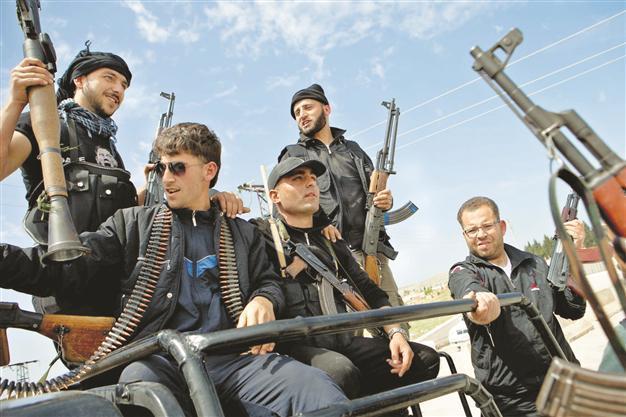World mulls arming rebels
ANKARA - Hürriyet Daily News

Syrian rebels, many of whom left their studies and jobs to join to the armed opposition, hold their weapons at a checkpoint controlled by the Free Syrian Army in Idlib in this file photo. AFP photo
Arming the Syrian opposition with more weapons is among the options the international community is considering, not for a military victory but for creating the political conditions for real negotiations, the Daily News has learnt.The Syrian National Council’s (SNC) meeting slated for this weekend seems to be important for various reasons. First and foremost, the participation of the Coordination Committee, a body created at the Istanbul meeting of 14 Western and Arab countries, will mark a first in terms of establishing a direct link between the international community and the opposition. Turkey’s and the United States’ ambassadors to Damascus, Ömer Önhon and Robert Ford, U.S. special envoy to the Middle East Fred Hof, and senior diplomats from other countries, will meet on the margins of the SNC meeting.
The message that will be delivered by the Coordination Committee to the SNC is a very important one. Western and Arab powers will try once again to narrow the differences among the opposition, to determine one interlocutor, and to help the SNC coalesce and come up with a transition plan.
The meeting will also raise the financial and logistical demands of the Syrian opposition. Compared with the past, the international community will be more willing to deploy more arms to the opposition.
According to sources familiar with the issue, sending more weapons is not aimed at winning militarily in the field, but rather making clear to Damascus that “the battlefield is not empty.” With the Syrian opposition becoming an increasing problem for Damascus, it is thought that a political situation could be created to facilitate real negotiations for regime change.
There are unconfirmed reports that Qatar and Saudi Arabia are providing weapons to the opposition.
HH Contingency plans
With Syrian troops massing near Aleppo, which is seen as a signal of another operation against regime opponents in one of the country’s largest towns, the meeting in Istanbul will also address contingency plans in the event of a massive humanitarian crisis.
Turkey has already said it will have to act if there is an undeniable crisis with hundreds of thousands of refugees fleeing across its borders.
Plans to possibly establish humanitarian corridors or a buffer zone; or to declare no fly zones, need close consultation between Turkey and its leading allies, sources said.
“Turkey is not willing to act unilaterally or even to lead a multilateral force,” they stressed, adding that action would require the leadership of the United States with the participation of a number of countries, only if a political decision was made by Washington.
“Everyone wants to avoid a war,” sources said, “the next couple of months will be very important as to whether a war will be avoidable or unavoidable.”
















